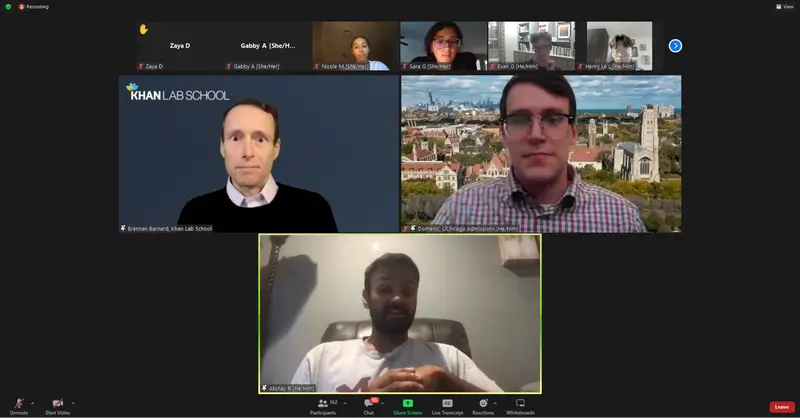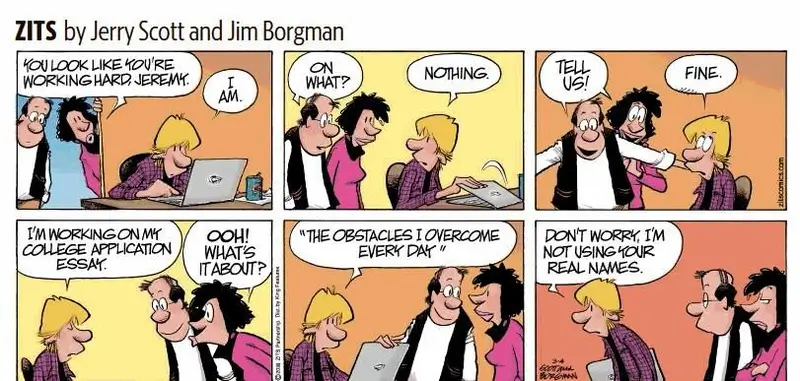UChicago Essays: Tips from Admissions

October is in full swing and we’re deep into the college admission process now. High school seniors are putting the final touches on personal statements, supplemental essays, and college applications, ready to submit early applications. Or are they? Maybe you’re on the other end of this. A blank google document staring back at you with the clock ticking down.
Have no fear! If you have no idea where to begin, there’s still help. On October 12th, Schoolhouse and UChicago hosted a webinar to help you get started with your essay writing.
Panelists:
Domenic Lamberti, Senior Associate Director of Admissions * Director of Faculty Engagement at the University of Chicago
Akshay R., founding tutor on Schoolhouse
Brennan Barnard, M.Ed, director of College Counseling at Khan Lab School

Why Write an Essay?
When sitting down to complete applications, the question most students ask is, “Why do I even have to write this? Does it even matter?”
Lamberti says that although many students regard the essay as the most dreaded part of the application (and often leave it for the very last minute) it is actually the most important part. Not only is it an introduction for admissions officers to get excited about what’s to come in your application, but it also is an opportunity to show them you have an active brain. A strong essay demonstrates that you can engage beyond a basic level and write clearly and concisely, and that you are passionate about a subject and able to do the work to put together a strong application.
Personal vs. Supplemental Essays
There are two different types of essays that you may be submitting for your application: A personal statement/essay and a supplemental essay. What makes the two different? Are there certain aspects that belong in one essay, but not the other?
The personal statement is the most common college essay you will come across. It’s known for being a part of the Common and Coalition Application, and must be submitted through these platforms for any school that requires it.
If using the Common App, applicants have an option to choose between seven different prompts and can answer the question in as few as 250 words and no more than 650 words. The panelists stress that your personal statement should be a simple, engaging story that centers around YOU. As much as they would love to hear about the tenacity of your grandma or siblings, they opened your application to learn more about you, not them.
Four rules of thumb to remember when crafting your essay are:
- Be mindful of your audience and pay attention to detail. Avoid offensive topics or crossing the “TMI line”
- Don’t try to be someone you aren’t. Stop highlighting your vocabulary and replacing it with complicated vocabulary you don’t use. Admissions officers can tell.
- Your personal statement isn’t a brag sheet or resume. Give new information beyond what admissions can find out later on your application
- Ask yourself the question: “So what? Why should the reader care?”
The supplement essay is an extra section that may be included on your college application. Not all colleges require them, but even if they are optional, panelists strongly recommend you seriously consider doing them. Supplement essays vary in subject, but each one is only seen by the institution that requires/recommends it. Therefore, this means your essay should only be applicable to that college, especially if a college is asking “Why Us?”
Some examples of supplemental essays include UChicago’s Uncommon Prompt and Rice’s “The Box” Project. When it comes to writing your supplemental essay, Lamberti recommends having the "Goldilocks Mentality"–crafting your essay so that it’s just right!
- Don’t be overly focused on one aspect
- Be wary of a “listy essay”
- DO YOUR RESEARCH!!
- Admissions officers know their school’s rankings–no need to repeat them
Lamberti also recommends performing the White Out test after completing your "Why This College" essay. Cross out the college name. Can your essay be applied to other colleges? If your answer is yes, then you may want to rethink your essay and personalize more towards your college of choice.
The Writing Process Recipe
Now that you know what college admissions officers are looking for and what each essay should contain, it’s time to get to writing! If you still have no idea where to start, here’s a simple recipe to make the process a little easier.
- Read and re-read the question. Make sure you know exactly what the prompt is asking you. If you still aren’t sure, ask around!
- If you are given an option of many prompts, brainstorm several of the choices. Choose the one that call to you the most.
- Make sure to answer the prompt.
- Have the right frame of mind when you sit down to right. You won’t be able to produce your best work if you aren’t emotionally prepared. Think of this essay as your own creative project, rather than just for a college application.
- If you’re still struggling on what to put on paper, just write down whatever comes to mind. Disregard proper grammar and coherence–just write anything that comes to mind about the topic. Once you’ve done that, you can read what you’ve written and see if you can scope out a clear topic to expand upon.
Final Tips
And that’s pretty much it when it comes to writing your essays for college! Some final tips the panelists offer at the end of the webinar include:
- Turn negatives into positives–if you’re writing about a negative experience, don’t solely focus on what went wrong, talk about what you learned from the situation
- Analyze and evaluate experiences, don’t describe
- Use appropriate fonts, spacing, and margins
- Be an active, not passive, writer
- Proofread! And let others proofread as well (two at most). Too many cooks spoil the pot when it comes to college essays.
- Give yourself time to answer supplemental questions! You’ll do your best work if you give yourself ample time before the submission date. If you write your essay, 12 hours before it’s due, it won’t turn out as good as if you gave yourself a good two weeks to a month to write your essay, proofread, and edit it.
And that’s it! You’ve got all the information you need to go and write your best personal statement and supplemental essays ever.
Don’t forget to have fun! If you need anymore college essay help, check out the Schoolhouse Community or the College Confidential Forums for more tips. You’ve got this!

Interested in UChicago?
Visit UChicago's CC school page, learn more about the University's focus on research, connect with others in the UChicago community, and watch the 30 second video below.